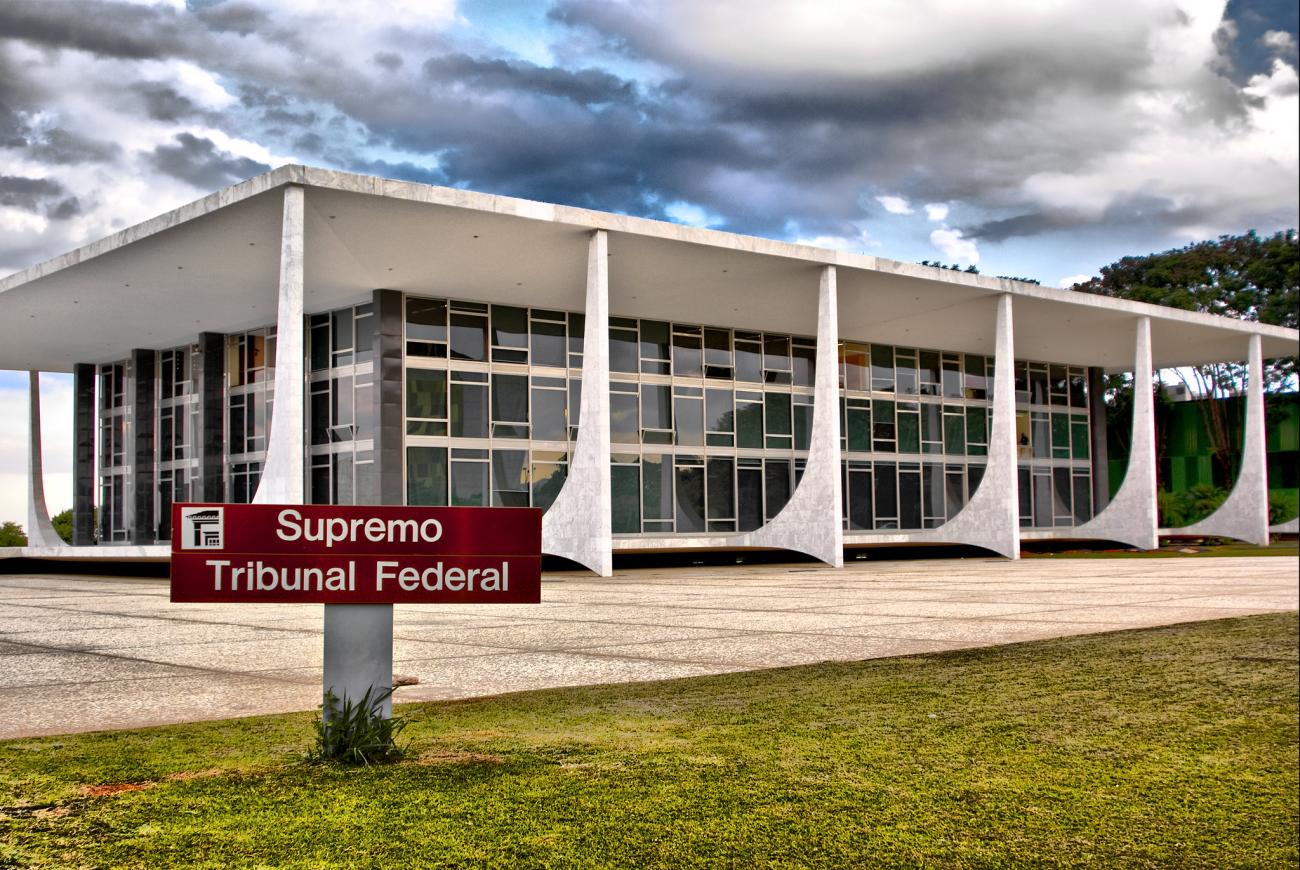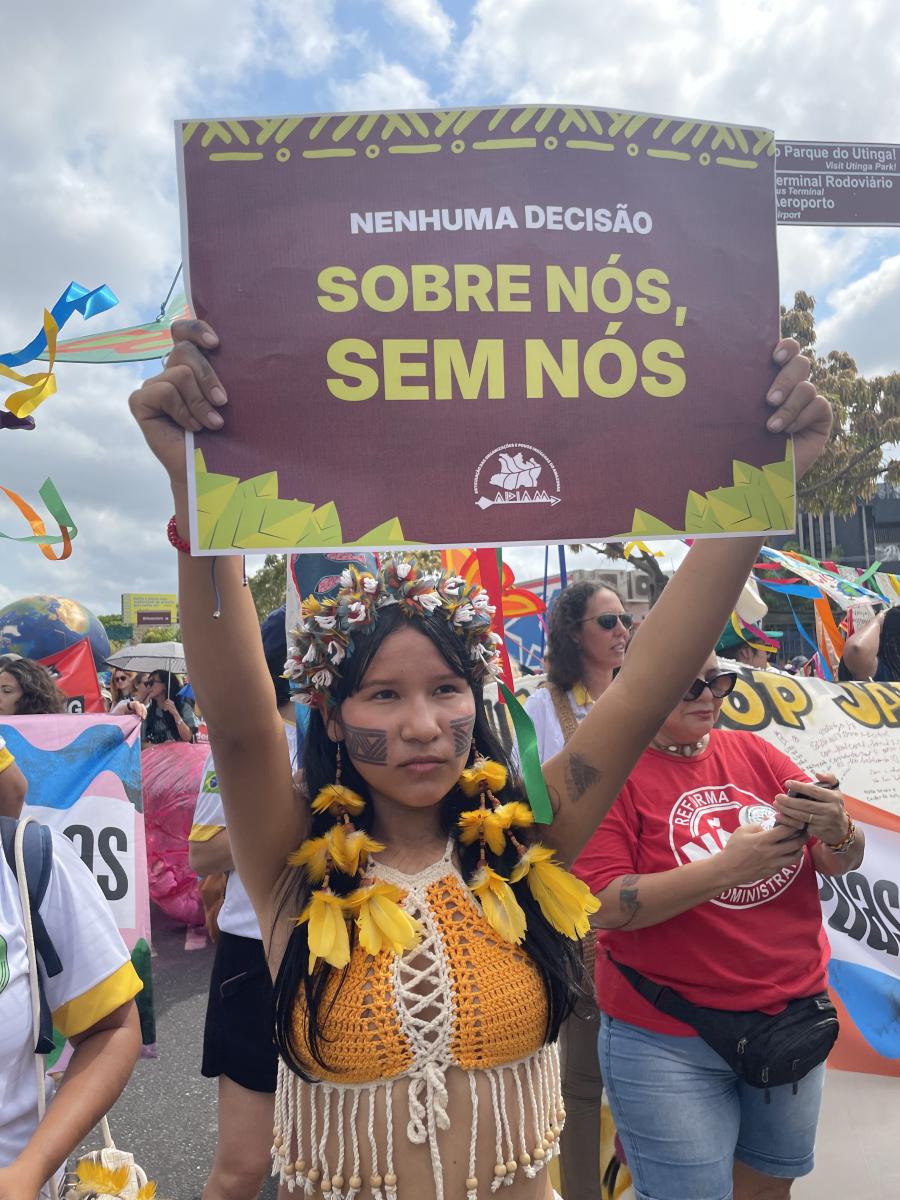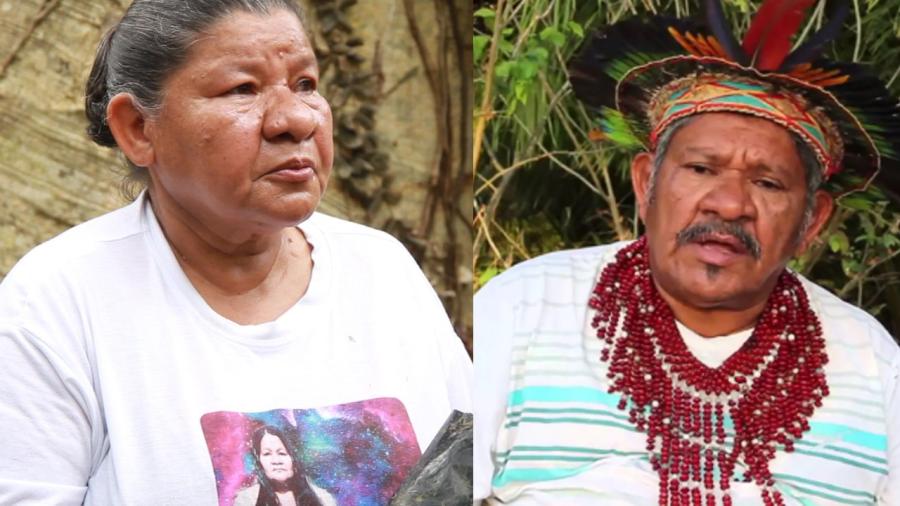
Photo: Brazil's Supreme Court. by Ricardo on Flickr.
By Edson Krenak Naknanuk
On August 8, 2020, Indigenous Peoples in Brazil won a great legal battle but the good news goes beyond the victory, for two reasons.
For the first time in history, Indigenous people in Brazil filed a lawsuit against the Brazilian State at the Federal Court on their own. Legal action like this is not easy nor is it possible to file in the Federal Court, unless it is done by a legal and recognized organization, “class entity”, such as a political party or trade union. But Indigenous organizations came together to form Articulação dos Povos Indígenas do Brasil (APIB), an association of Indigenous Peoples, which without prior legal recognition went to the federal court as the protagonist and author of the lawsuit. APIB`s Indigenous advocates raised their voices without a mediator. They made their own claims and their own strong step towards justice accusing Bolsonaro’s government of omission and irresponsibility. They did that to prevent genocide during the COVID-19 pandemic.
What is also historic is the recognition of Indigenous Peoples’ status which was never before considered. Before Indigenous Peoples were considered legally protected by the State and in need of someone or another institution to represent them. The decision of the federal judge, therefore, recognizes the legitimacy of Indigenous Peoples to present legal action, generating jurisprudence even for other minorities and groups of women, young children, refugees, etc.
As pointed out, the 1988 Constitution establishes that only recognized class entities can file an elective action in the Federal Supreme Court (Supremo Tribunal Federal -STF). However, in the recent decision, Supreme Court Justice Luis Roberto Barroso, who was responsible for reporting the case to the Justice House, affirmed that the APIB "has active legitimacy to propose direct action before the STF", that is, it recognizes that APIB is a social and cultural entity as well as a class entity, other than economic or political.
This new interpretation of the article 232 of the Constitution expands the understanding and constitutional rights of Indigenous Peoples in Brazil, allowing Indigenous Peoples and their communities and organizations standing under the law to sue to defend their rights and interests. The lawsuit comes amid several failures of the government in protecting Indigenous people, whose vulnerability and rights violations have multiplied during the COVID-19 crises, as has been detailed and denounced by Cultural Survival since the start of the Pandemic.
The Claim
In the action, APIB states that fundamental precepts of the Constitution are being disrespected with the "failures and omissions" of the government in protecting Indigenous Peoples against COVID-19. These populations have a death rate for the virus of 9.6% - while in the general population the rate is 4%, according to the State health agencies.
The government, despite being warned of the urgency and danger that Indigenous communities were in, decided not to do anything for months, denying the seriousness of the pandemic and the threat of the virus. Meanwhile, the government encouraged invasions on Indigenous lands, weakened the agencies responsible for monitoring and protection of forests, dismissed important federal police officers and public agents responsible for the conservation of the Amazon as well as protection of Indigenous areas. The president publicly supported his environment minister's projects to relax deforestation laws in the Amazon. Moreover, FUNAI, the state agency for the protection of Indigenous Peoples in Brazil, has been gradually dismantled, even their website's English pages have disappeared. When the government, pressured by national and international opinion, decided to do something, Indigenous people in urban areas were deliberately abandoned and excluded from health and protection programs.
APIB affirms that the performance of government officials in the face of the epidemic among Indigenous Peoples constitutes a "true attempt of genocide, which may result in the extermination of entire ethnic groups" and called for specific measures, such as the creation of a sanitary barrier and the removal of invaders from Indigenous lands. They also state that “the lack of transparency of the State, the underreporting of cases and the absence of a coordinated and integral policy of the agencies of health policy makers” worsened the situation.
The Indigenous lawyer Eloy Terena, the “Voice of Indigenous Peoples in the Supreme Court” who spoke to Grupo Gente Nova, a media firm in Brazil, affirmed days before the action: “The federal government's inaction in the pandemic is exacerbated by President Jair Bolsonaro's clear anti-Indigenous agenda, colluding with the accelerated growth of deforestation and invasions of Indigenous lands...We have entire communities with the presence of the virus and even so, there are no concrete measures by the federal government. This worries us a lot and, therefore, we go to the Federal Supreme Court to seek these measures.”
APIB argues in their lawsuit that the contingency plan of the Brazillian Health Ministry –SESAI–entitled the “National Contingency for Human Infection with the new Coronavirus in Indigenous Peoples” was a document formulated without any participation of Indigenous Peoples, in spite of the provisions of ILO Convention 169, and “is absolutely vague, without concrete measures, and has not been operationalized in a minimally adequate way." A recent analysis of the plan by Cultural Survival came to similar conclusions, communicated in an open letter to the Bolsannaro administration.
Eloy Terena stated in an article in Folha de Sao Paulo, a widely circulated newspaper in the country, that “Indigenous people are obliged to force the government not to let us die."
As denounced by Cultural Survival, the Brazilian government has failed to protect Indigenous Peoples; therefore legal action was necessary in the face of the immense neglect of the government executive in Indigenous health. Due to the seriousness of the situation, APIB asked allies, political parties and organizations who understand the situation to sit down with them in court and offer support.
The Nature of The Law
The action was highly technical and only the Federal Supreme Court can rule in this kind of case. The federal or constitutional court names this type of action as a claim of non-compliance with fundamental precept, ADPF by it’s Portguese acronym. This law expressly established the possibility of examining the compatibility of the pre-constitutional law with norms of the current Constitution of the Republic. ADPF is admissible every time when there is a relevant controversy on the legitimacy of federal, state or municipal law prior to the Constitution based on a fundamental precept of the Constitution. It is important as well because there were several laws, such as 1973 State Indian Law, for example, that still prevail in the society's legal memory. The ADPF, thus, is the only mechanism of constitutional control over laws that pre-date the current Constitution drafted in 1988.
The Court's Decision
After a long 10-part argument demonstrating with technical and official data the epidemiological, demographic, political and geographic vulnerability of Indigenous Peoples and the criminal actions of the Bolsonaro government, the Federal Supreme Court unanimously ruled in favor of Indigenous Peoples.
The decision accepted the main points of the action, and granted immediate effect. Among these measures are: planning with the participation of communities; actions to contain invaders in reserves; the creation of sanitary barriers in the case of Indigenous People in isolation or those recently contacted; access by all Indigenous people to the Indigenous Health Subsystem; and the elaboration of a plan to confront and monitor COVID-19.
The reporting judge, minister Barroso, opted for a more consensual approach, despite giving a clear and historic victory to Indigenous Peoples. Barroso informed that he tried to act, in this case, as a “facilitator of decisions and measures that ideally should involve dialogues with the public authorities and with Indigenous Peoples, without neglecting, however, the principles of precaution and prevention.”
In the trial, the judges referred to not only Indigenous rights in the Federal Constitution of 1988, but also international treaties and laws, of which the country is a signatory, such as Convention 169 of the International Labor Organization (ILO), which recognizes among other things, the right to Free, Prior and Informed Consent (FPIC) with Indigenous Peoples in the case of measures that impact their territories.
The Supreme Court Ruled the Following:
1. SITUATION ROOM: That the federal government install the Situation Room to manage actions to combat the pandemic regarding Indigenous Peoples in isolation or in recent contact, with the participation of communities, through APIB, the Attorney General's Office and of the Federal Public Defender's Office. Members must be appointed within 72 hours of the decision being informed, and the first virtual meeting must be convened within 72 hours after the appointment of representatives;
2. SANITARY BARRIERS: That in 10 days, from the announcement of the decision, the federal government will listen to the Situation Room and present a plan for the creation of sanitary barriers in Indigenous lands;
3. COVID-19 Tackling PLAN: That the federal government elaborates in 30 days, from the knowledge of the decision, with the participation of the communities and the National Human Rights Council, a COVID-19 Coping Plan for Peoples Brazilian Indians. Community representatives must be defined within 72 hours of the decision being made aware of;
4. CONTAINMENT OF INVADERS: That the federal government include in the COVID-19 Plan for Confronting and Monitoring Indigenous Peoples a measure to contain and isolate invaders in relation to Indigenous lands. He also stressed that it is the duty of the federal government to draw up a withdrawal of invaders plan and that if nothing is done, it will return to the topic.
5. Indigenous HEALTH SUBSYSTEM: That all Indigenous people in villages have access to the Indigenous Health Subsystem, regardless of the homologation of lands or reserves; and that non-villagers also access the subsystem in the absence of general SUS availability.
Fundamentals of the Decision
In the decision, it was pointed out that the Indigenous Peoples, for historical, cultural and social reasons, are more vulnerable to infectious diseases, with a mortality rate higher than the national average. In addition, there are signs of an accelerated expansion of the contagion of COVID-19 among Indigenous communities and the State took insufficient action to contain the virus. The court also clarified that Indigenous people in situations of isolation or recent contact are more at risk and should be urgently protected, with confinement and isolation of the areas.
Barroso also recalled that the creation of the Situation Room for Indigenous Peoples is foreseen in an ordinance of the Ministry of Health and FUNAI, thus not representing interference by the judiciary power in the Executive. "There is no need to talk about interference by the Judiciary over public policies, but rather about the mere judicial implementation of a federal rule that is not being observed by the executive branch."
In addition, the participation of Indigenous People in the process was highlighted as an “indispensable” element so that each community can bring up information and requests to the responsible government and authorities.
On the land invasion, Barroso added that the situation is not directly related to the pandemic, but that the authors of the action speak of 20,000 invaders in only one of the areas. The removal would involve the risk of armed conflict, in addition to the need for police and military forces to enter the different areas, increasing the risk of contagion. For Barroso, "the government must organize itself to face the problem, otherwise it will grow and worsen." It is not a measure that can be taken "by simple act of will, with pen and ink," he said.
The justice pointed out that the lack of health provision through the Indigenous Health Subsystem for people living in unapproved lands is “unacceptable.” “The identity of a group as an Indigenous People is, first of all, an issue subject to self-recognition by members of the group itself. It does not depend on the homologation of the right to land."
Finally, Barroso also heeded APIB`s argument that the previous National Contingency Plan for Human Infection with the New Coronavirus in Indigenous Peoples is “vague” and “a plan that expresses mere general guidelines and does not provide for concrete measures, schedule or definition of responsibilities”. Besides that, the plan did not count on the participation of Indigenous communities violating their very right to Free, Prior and Informed Consent.
Government’s Reaction: Silenced Voice at OAS
During the trial and, repeated at the decision, the judges affirmed not only the Indigenous rights provided by the Federal Constitution of 1988, but also international laws and conventions such as ILO 169, which recognizes the the right to territory and which ensures, among other things, the Indigenous Peoples’ right to prior consultation in the case of measures that impact their territories.
Despite these measures, on the next day, the government of Brazil reacted by barring Indigenous guest and leader Nara Bare from addressing the Organization of American States (OAS) Permanent Council at the Annual Inter-American Week for Indigenous Peoples. The OAS is the oldest regional body in the world, founded in 1948, and originated in the International Union of American Republics (1889-1990), with the objective of promoting peaceful relations in the Americas.
The Ambassador of Brazil to the Organization of American States, Fernando Simas Magalhães, canceled the appointment of the leadership Nara Baré, executive coordinator the Coordination of Indigenous Organizations of the Brazilian Amazon (COIAB), to speak during the meeting of its Permanent Council. In response, COIAB stated they strongly "repudiated the cancelling of the participation of our leader in this important space for international debate and issues on human rights. COIAB believes that this is yet another act of discrimination and censorship on Indigenous Peoples by the Brazilian Government. It is unacceptable and shameful that the Brazilian Government, with the support of the OAS, silences Indigenous voices in an attempt to hide their actions and policies for dismantling Indigenous rights and their inefficiency in facing the COVID-19 pandemic."
Next Steps
This fight is not only for Indigenous People, but for everyone who loves our mother earth and our planet. The battlefields are in many places, in the court, in the city and in the villages. The next steps to protect and guarantee Indigneous rights are not easy. We need to observe, inspect and charge the government to comply with its own laws and to obey its Constitution. We need allies to help us do this because we know that many times the government refuses to comply with the law and approaches us to poison and destroy us. But we know we have allies.
Eloy Terena quoted Yanomami leader Davi Kopenawa in his closing remarks from his book The Fall from the Sky: “I would have liked to say to the whites, already at the time of the road:‘ Do not go back to our forest! Your Xawara epidemics have devoured enough of our parents and grandparents here! We don't want to feel such sadness again! Make way for your trucks away from our land!’”
--Edson Krenak Naknanuk is an Indigenous activist and writer in Brazil and a Cultural Survival consultant. Currently, he is a Ph.D. candidate in Social and Cultural Anthropology with studies in Legal Anthropology at Vienna University, Austria. He is also a teacher. He loves interacting with children and youth and preparing them for a better world.


